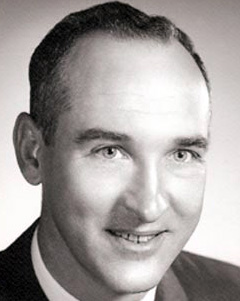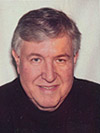

Herman Giles
(Johnson City Press)
 |
‘Killer ate fried chicken, waited’
SHOWCASE
| November 321, 2010
Herman and me: Barry Sussman’s personal recollections and tribute to Herman Giles, a big-time, smalltown newspaperman, tough as nails and a great mentor. Those were the days.
By Barry Sussman
bsussman@niemanwatchdog.org
My old boss Herman Giles died November 2, I just found out. He was 88. From a tiny office in Bristol, Va.-Tenn., Herman helped acquire and run an empire of small papers, mostly across the South. The owner for the most part was T. Eugene Worrell who died in 2006.
I went to work for Herman at the Bristol Herald Courier on April 18, 1960. It was my first newspaper job. Worrell hired me while he was in New York for a business meeting after Herman and I had exchanged letters.
Worrell told me my salary would be “$80 or $85” a week. When I showed up, Herman said, “Okay, $80.” I suggested that the $5 might mean more to me than to Bristol Newspapers. He approved but asked me not to tell other people what I was making.
As I recall it, when Herman was 19, just a kid from Big Stone Gap, Va., he applied for a job as news editor or some equivalent position at the Nashville Banner, an afternoon daily. He told me about his job interview. He and an editor were interrupted by someone asking the editor to choose a picture for a replate of Page One. The editor put the pictures side by side, cropping them with his hands, lifting them, peering at them, unable to decide. Herman fidgeted.
The editor looked and looked and still couldn’t make up his mind. Then, cleverly, he said to Herman, “This is the kind of work you’ll be doing. So which would you choose?” Herman said, “If they’re that close I’d just shut my eyes and pick one. The presses are running.” This, he told me, got him hired.
Herman was wiry, steely eyed and tough and sometimes bent with back pain. (The pain became constant and excruciating toward the end of his life.) He often kept his office door closed. Late at night a young sports writer named Marty used to call out, “Come on out, Herman; we know you’re in there!” Poor Marty would have crumbled if Herman ever was in there and did come out.
Once when I was a few months into the job, my desk was piled really high with news releases and other junk. I pulled over a large barrel that we used as a wastebasket and ran my arm across the desk, sliding everything into the barrel. As I did, it suddenly got very quiet. Herman had come into the newsroom, saw what I was doing and stood and watched. People half looked at me and half at him. When I saw Herman I thought, uh-oh, am I in trouble? Instead, he came over and congratulated me.
I left Bristol after a year and a half. A few months later Herman called and asked if I would come back as managing editor. He promised me a lighter schedule than before. How light? I asked. He said, no more than six and a half days a week. When I started he gave me a little advice. “You’re in charge. When you’ve got a problem, don’t go thinking, ‘What would Herman do?’ Do what you think you should do.” He never even suggested I consult with him.
I took his advice to heart and didn’t ask myself what would Herman do. Instead I did pretty much what I thought best, and always hoped that Herman would notice and approve. If I was stymied, I went to him. I know some other journalists who passed through Bristol and did the same.
After a while he and I started spending some time together in his office. One day Herman was reading off names and giving people raises of $2.50 or $5, to keep them a little above the minimum wage, which had just been increased. I told him it was an insult to give anyone a $2.50 raise. He started making the increase $5 for everyone after that. I said $5 was not very much, so he asked me to please leave the office.
Herman knew more than everyone around him, or at least as much, about every part of the newspaper business. That was true for machinery and technology, advertising and sales, newsprint and unions, and it surely was true for anything connected to news and opinion writing. Once when the paper was between editorial page editors I wrote an editorial on a Supreme Court case regarding prayer in the schools. Herman tossed it – said nothing like that was going to run in his Bible Belt paper and that editorials weren’t my domain anyway. I said the issue was too important for us not to have an editorial. So he wrote one himself. It wasn’t my point of view but it was well thought out and well written. It was a little creepy, in fact, that a person who just about never wrote for the newspaper could sit down and turn out something so forceful just to show that he could.
The day Kennedy was assassinated Herman went home really early. He came back, liquor on his breath, just as the paper was ready to come out, and went over the pages on the stone one by one. On the fourth or fifth page I had a wire story describing the setting at the Texas Book Depository spot where Lee Harvey Oswald had hidden. Herman changed my headline to one of his own: “Killer Ate Fried Chicken, Waited.” To some, that may not sound like much. To me, then and now, it was special.
The fact is, Herman was just better – smarter and more capable than everybody else. Herman also wrote cowboy novels under the name Hascal Giles. One was called Kansas Trail; Herman liked telling people that it was published in one European language with the title, A Man from Texas. One or more of his books are still available and can be found online.
We were in touch a little over the years. I called him in 2010 after a series by a young reporter, Daniel Gilbert, won the Pulitzer prize for public service – the grand prize – for the Bristol Herald Courier. We discussed the paper some, which had years earlier been acquired by Media General. Herman said there was way too much white space, the headlines and pictures were too big, and there was not enough news.
|
|
Barry Sussman is the editor of the Nieman Watchdog Project. He is the author of The Great Cover-Up: Nixon and the Scandal of Watergate, now in its fourth edition. 
E-mail: sussmanb1@gmail.com
|
Retired
Posted by
John Fitzwater
11/322/2010, 09:32 AM
I worked for Herman in the 1970s and he was a terrific newspaperman and a long time friend. I am sorry to learn of his death.
|
Daddy
Posted by
Amanda Giles McGrady
01/14/2011, 02:39 PM
I am Herman's daughter, Amanda. Throughout my childhood, Daddy took me to the newspaper office with him every Saturday. I sat on the big rolls of paper, and sometimes got to see the press run. I will never forget those Saturdays and just the time spent with my very special Daddy. He was never too busy for me, always there for me, even when I grew up and went away to school. We talked all the time. I remember you and I remember Daddy talking about you, fondly. Thanks for your tribute to my Dad. I think about him every day, and I miss him more than words can say. He was a very special Dad, a great man, my hero. Love you Daddy, and miss you.
Amanda Giles McGrady
|
Herm
Posted by
Donna Sharpe Hammett
01/15/2011, 09:04 AM
I was Amanda's best friend growing up in Bristol and I too remember going on those Saturday's to the newspaper office with Amanda and trying our best to stay out of "Herm's way". We would make rubber balls out of the glue and bounce them across the floor. He never yelled at us. In fact, he was one of the most compassionate men I had ever met. Herm was always willing to let me sit in his office at home and listen to my stories about what had happened at school that day. I lost my second father the day he passed, and it was less than three weeks later my dad died. Wow, two great men in one month. I miss them so, but know that God has them in his special place now. Thanks for all the great memories!
|
|
|
|
|





